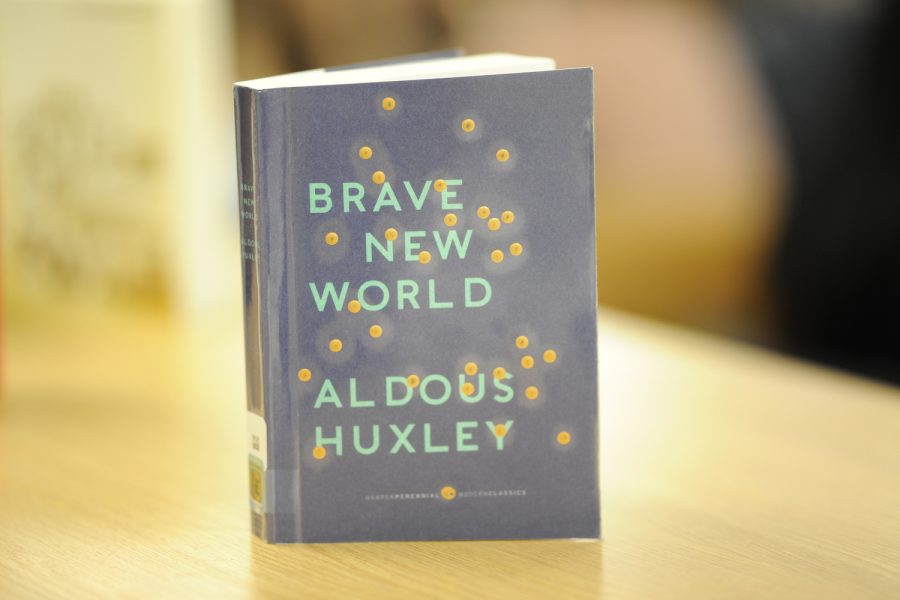‘Brave New World’ by Aldous Huxley: Worth the Read
‘Brave New World’ is available in the Bronx Science Library. Our librarians have just bought stunning new copies!
While conducting research for the front page editorial “Genetic Modification: Worth the Risk?” I became fascinated by the connections between the controversy of emerging Crispr technology and a 20th-century novel, ‘Brave New World’. The editorial grapples with the morality of genetic modification, a topic that is unsurprisingly complex. In the process of researching for my editorial, it was recommended that I read ‘Brave New World’. Immediately, I was hooked. ‘Brave New World’ by Aldous Huxley is a powerful and influential story. This dark book, deeply reflective of society and human nature, shifts the way hardships and adversity appear in the world around us.
‘Brave New World’ brings a perfect, horrifyingly blissful world into sharp focus. Citizens are created in factories rather than through the messy process of human pregnancy, and every last factor is accounted for in creating the flawlessly ignorant modern society. Social classes are determined by genetic modification and brain development allowed during fetal formation. As such, workers are perfectly tailored to suit their jobs. No relationships are formed, so no sense of loss or conflict can occur. Lust is permitted to roam freely without the constraints of marriage and concepts of faithfulness, and society is fed the message that everyone belongs to each other. People are born to be genetically immune to illnesses, and supplements keep citizens forever young and healthy.
Through this all, society is constantly fueled with a supply of soma, a drug without side effects that brings citizens on “holiday,” an escape from the smallest trifles in everyday life. Nothing but bliss exists for the inhabitants of this world. Every aspect of ‘Brave New World’ perfectly fits the definition of a utopia. So why is it that it seems so strictly dystopian?
Usually, dystopian novels include some fatal flaw, some sense of suffering that citizens are forced to bear. But in this reality, no suffering exists. Even basic human urges, such as the desire for adrenaline rushes and dopamine highs, are delivered through monthly sessions where citizens are pumped full of the stuff. No human emotions that cannot be satisfied are allowed to form during fetal development. Everything works seamlessly. And yet… why the unease?
Humans are constantly working towards a world where adversity is minimized and problems exist to be solved. ‘Brave New World’ reveals that it is exactly for this reason that adversity is necessary. We need the juxtaposition of the suffering in order to feel truly alive. A sense of gratefulness is only prompted by the adversity others face, and a sense of purpose is only reached with problems to solve. ‘Brave New World’ struck me as dystopian because it fit the definition of a utopia: a place where no suffering exists. In such a reality, the human race would lose its humanity.
The applications of this realization are endless. Many have erupted at the possibility that scientist He Jiankui has created the first genetically modified humans, saying these modifications are against the natural order of things. In some ways, it seems to me their argument is reinforced by the reality in ‘Brave New World’, and that editing out the genetic adversity we face is not only against nature in general, but it is against human nature. Human nature requires that we have challenges to fight, and simply erasing our issues seems to fully contradict this necessity.
Usually, dystopian novels include some fatal flaw, some sense of suffering that citizens are forced to bear.
Yet, even still, to what extent should we let adversity remain where it lies? What justification is to be presented to the suffering when the technology to end their struggles existed? ‘Brave New World’ may be used to warn against the use of Crispr, but there are countless other elements at play that erase human struggles within the novel. Genetic modification alone does not achieve this dystopia.
Taylor Chapman is the Editor-in-Chief of ‘The Science Survey’ and an Academics Section Reporter for ‘The Observatory.’ The learning experience...

